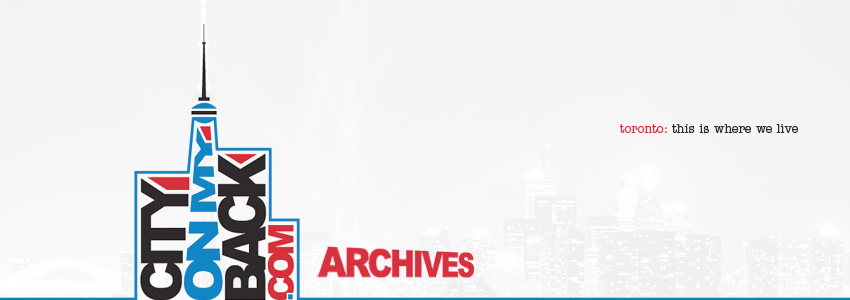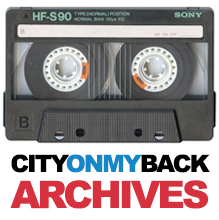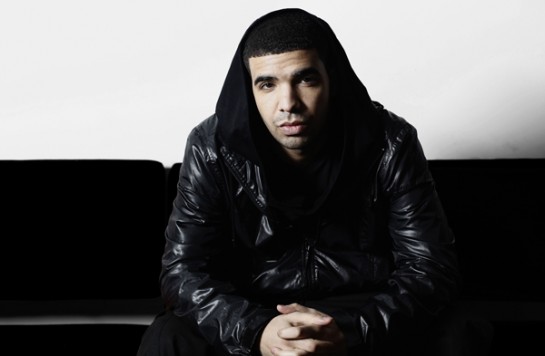INTERVIEW: Drake (w/ InsideVandy.com)
Seen on HHC!
Throughout the year, The Recording Academy (the folks behind The Grammys) hosts a series of conversations with artists from all over the country. Last week, the Nashville chapter held a Q&A with hip-hop artist Drake, whose fascinating background and radio hits (such as this summer’s “Best I Ever Had”) have thrust him into the spotlight as the genre’s up-and-coming artist to watch. We sent guest writer and Recording Academy member Andrew Tritter to the program to take down what he could from the Academy’s conversation with the rapper who is poised to take over 2010.
Full interview after the jump!
Previously: New Video: Dj Khaled feat. Usher, Drake, Young Jeezy & Rick Ross “Fed Up” (Snippet)
Versus Magazine: This is not your first trip to Nashville, correct?
Drake: No, it’s not. Nashville is a great city and my father lives in Memphis, so I used to drive down here all the time in this Mercury Cougar [laughs]… and that’s where I got a lot of music knowledge, actually. My dad used to give me 30 minutes to play hip hop on the 24 or 25 hour drive — he’d let me put on rap tapes and then he’d make me listen to Marvin Gaye, The Spinners … that really penetrated my mind as a young kid. So, yeah, the whole state of Tennessee is very valuable to me.
VM: Your father’s side of the family was very musical — how did your father and that side of the family influence your music?
Drake: My dad was always a musician. My first time performing I was really young, probably like eight or nine, and he had taken me out when he wasn’t supposed to (because he had a gig and he was looking after me), and he thought it would be interesting to bring me up on stage to sing the one song that I knew, which was “Ride, Sally Ride.” So I ended up on stage performing with my dad, and everyone in the place thought it was the cutest thing in the world. I don’t remember much about my childhood, but I remember that night.
Also, the culture of Memphis … see, Toronto is very multi-cultural, it’s a booming city. So to go between Toronto and Memphis and get the different types of music, the different food, the different feeling … coming from Toronto, I always wanted to see more.
VM: Was there any music on your mom’s side of the family?
Drake: Yeah, but it was classical pianists and things of that nature. But my mom… my mom used to force me to say things as colorfully as possible. She would never let me get by with saying, ‘Well, that food was good.’ No, I had to say, ‘That food was delicious,’ or something extravagant. My mom was responsible for a lot of the way I write, the way I choose to say things. That’s where the music comes in on my mom’s side.
VM: How did it come about that you ended up on Degrassi?
Drake: I was in eighth grade and there was this kid in my class whose father was an agent. My biggest problem in school was that I was an attention-seeker, so I was always trying to make people laugh in class. And this kid was like, ‘You’re funny, you’ve got timing. You should meet my dad, my dad’s an agent. You’re mixed, and you have a presence about you.’ So eventually in grade nine I took him up on his offer and went to meet his dad, and his dad was completely like the opposite: “I don’t think [this kid] really has anything to offer…’ [laughs]. I thought I was gonna walk in there and be a star, and he was like “Nah, you don’t really have it.”
I used to go to a predominantly white school. I was actually the closest thing to a black person at my school, and it was a very painful process and time. Kids don’t always understand. The Jewish community was very wealthy, they kept to themselves. It wasn’t necessarily that I was black that bothered them, it was that they didn’t understand me being black and Jewish. And also from an early age I was doing print work [modeling]. I used to have embarrassing catalogs come out … I remember one time this kid invited me to a party. And I never used to get invited to the parties, and I’m talking this was a party, you know what I’m saying. So this kid Chris invited me, and his family was super wealthy, and this girl I liked was gonna be there. So I went out and got this nice little Perry Ellis sweater, and I showed up and there was this picture of me on the door in a Power Rangers costume, from like a Wal-Mart photo ad. And I realized they invited me so they could make fun of me. But I was too embarrassed to call my mom to pick me up, so I actually walked an hour and a half home from this party, because I didn’t want her to think I didn’t have a good time. Suffice to say I really did not like going to that school, and I wanted to go somewhere where there was more variety.
So anyway, grade nine was a hard year. I had met with an agent before, and he set me up with an audition for this show called “Degrassi” … and, funny, I’ve never told this story before but I had actually smoked Marijuana for the first time before I went to the audition, [laughs] so, it was going to be fun. I was in the bathroom splashing water on my face and all this stuff. But that actually led to me actually leading a very clean cut life! [laughs] But I guess that got me a little looser and I gave it my all, trying out for this role of a white football player. A few weeks later while I was in school my mother called my phone and said, “They’re changing the role to a black basketball player.” And I remember everybody at school was in this little courtyard signing yearbooks, and I walked away and I never said goodbye to anybody. I just left. And that was my first step toward finding myself as a person. I got a little more confident.
VM: So, from that one performance where you performed with your dad, singing “Ride, Sally, Ride,” was music still a part? Were you still thinking about it? I know on Degrassi you actually had an idea where you wanted to do some songs on the show.
Drake: They knew that I was recording music in my spare time, so they encouraged me to rap on the show. But really when I first started to rap was when I went to this new school, complete other side of the spectrum. This was in a predominantly Jamaican side of town, and the school had a reputation of being tough, and it was better to deal with than what I was dealing with before. From about grade 8 I was writing raps in notebooks, I don’t know why I did it … I bought turntables. I was into it, but I kept it really quiet. I remember when Bow Wow was just the be all the end all, for me… it was so exciting, because I was like, “That’s what I want to do!” But I used to keep it very quiet.
So this new kid comes to school from Chicago and he automatically sets himself up as “The Rapper.” Like, “I’m the rapper, don’t nobody try me, I rap.” So I hear what he’s saying and I go to a couple battles and stuff, and he’s all right. In the middle of one of these battles at the school dance we got in a little bit of an argument, and he was like, “You know what, let’s rhyme!” So I had this battle on my hands like a week later. I wrote all these raps, and I showed up at this battle, as this kid from Degrassi … so many people from around this time were saying, “Yo, the kid in the wheelchair form Degrassi is going to battle!” [laughs] So I show up, and I step up to the plate, and I really obliterate this kid’s whole presence as a rapper at this school. But I never like battle rapping. I’m a writer, I’m not really into freestyle.
VM: There’s a story about how a cellmate of your father’s … you would actually rap with him over the phone?
Drake: [Laughs] yeah. My dad did a little time, and he used to share a cell with this rapper named Poverty. That was actually the first person where I technically rapped. But my dad really didn’t have anyone to talk to, and so he used to share his phone time with this guy. He got on the phone and he said he was like, “I’m a rapper,” and I was like, “Oh, I write raps, too,” and he would rap, and I would rap, and we became a little team until my dad got released from jail. It eventually became like, “Hey dad, yeah, yeah, what up, cool, ok, put uh, put Poverty on…” It was a cool little thing that allowed me to realize that I can rap the things that I write down.
VM: So, you were raised Jewish?
Drake: Yeah, but, I mean, very lightly. I was like … light Jewish [laughs]. We didn’t go to synagogue or anything extremely like super-Jewish. I did celebrate the High Holidays. I had my Bar Mitzvah in the basement of an Italian restaurant. I remember I used to have a crush on this girl, and at the time Backstreet Boys’ “I want It That Way” was a big song, and I remember that night, nothing else mattered — I had to dance with her to that song. Meanwhile, kids were like, renting out baseball stadiums and doing just the most extravagant things you could think of … it was this competition between parents at my school. They would have people come and perform and dancers … mine wasn’t like that.
VM: So you put out this new mix tape, and another tape, and there becomes this bidding war over you, and there’s different labels that want to sign you. Can you kind of go over how all that happened, and how did you end up with Young Money?
Drake: If you believe in the people around you, it’s a great feeling to succeed with those people, rather than just somehow getting into a position of success. So much of this business is about building a group of solid individuals great goals and trying to build a brand. That’s the most important thing.
The call [to join Young Money] came from a guy I know who always claimed that he knew Lil’ Wayne, and I was always like, “Yeah, right.” So I was getting a haircut, I was at a barbershop, and my phone rings, so I answer and I go, “Hello,” and the other like is like, [croaky] “Hello” [laughs] and I go, “Who is this?” and he goes, “It’s Weezy, Weezy.” and I’m like, “Uhhh … Lil’ Wayne?” and he’s like, “Yeah. I just heard some of your songs.” So anyway, basically he told me, “I need to fly you out tonight, I need to meet you, because I heard your songs.” And one was a freestyle over “A Milli,” and he was basically saying, “I believe in what you have to offer.” And he flew me out to Houston the next day, and that was the start of everything.
VM: When you started putting together the mix tape, did you ever imagine that it would come to this? That major labels would be bidding over your services?
Drake: Um, I think it would be a lie to say that wasn’t the goal. I didn’t know if it would happen or not, but to say we were shooting for whatever beyond the stars, that was what we were doing. And yeah, I didn’t know … It’s funny, I listened to the tape and I realized that there weren’t very many up-tempo songs on there, so I did two songs at the very last minute. And I was super convinced that one of them, “Uptown,” was going to be the single, and “Best I Ever Had” was just like, “Oh, whatever…” And we put out this body of work that we truly all believed in. Whatever it was going to do, it was going to do. Actually, the first three days it came out were really a low point, because people were like, “What is this guy doing? He’s singing and rapping, and this is super weird.” There was great feedback, but at the same time we were all having a nervous breakdown, like “Are we crazy?” And it took a while … it takes a while. And when people were given that time, it exploded. And it exploded beyond our wildest dreams.
VM: And what did you feel that a major label deal would offer you that you couldn’t have already?
Drake: I fought the whole label thing for a long time. I used to sit around and just be like, “Let’s just put it out ourselves, let me remain the underdog, and just keep putting out these records on this independent scale.” The problem with that is, it’s very unrealistic as an artist to do that. I’m still in control of everything, I do everything, we do everything, I’m very hands-on. But at the same time, when it gets to a certain point you need the machine that is a label. And we got on that scale thanks to Wayne. Wayne did a lot for me from the very early stages. The foresight he had just meant the world to me, the biggest sign of respect that I’ve ever had. So the choice [as to which record label to sign to] … it was a no-brainer to me.
VM: There were a couple interviews where you said the money wasn’t the most important thing. And obviously you’re very in control of your career, and it just strikes me that you’re very smart in that a lot of people in the position that you’re in will just sign away everything just to have that shot.
Drake: I always saw the value of what we can build on our own. We did “So Far Gone” by ourselves, really. My managers hadn’t even heard of it until it was out two days later. It was important to me to keep that grassroots feel. All I really wanted was creative freedom, and a lot of people could not offer me that, so I took the situation and considered that. There is nobody that can come to me and say, “We need this album on this day,” there’s nobody that can come to me and say, “The cover has to look like this,” “You have to dress like this,” there’s nobody that can tell me what to rap about or what shows to go to, there’s nobody that can tell me anything. If you have an opinion, of course I will listen to it, but there’s no one that controls my position in this game. And that way, if I make a mistake, I get to look at myself in the mirror and go, “You gotta pull it together.” Because I don’t like being able to say, “It was that guy’s fault.” I want to learn from my mistakes.
VM: Tell us about the music and why it is what it is for you. Why are you a gangster?
Drake: I wear knitted sweaters.
No, I think it all started with a genius by the name of Kanye West, who made the choice when there was nobody doing anything in that lane. He made the choice to make a brand of witty, intelligent rap that referenced the hood, that referenced things like dope wars but never … he never claimed anything other than what he truly was. It was the first time I ever felt like, here’s someone who’s not a thug, that I genuinely connect to. That I believe in, you know. Because there’s thugs that I believe, you know, like, I believe Young Jeezy, because I know Young Jeezy and that’s my big brother. I believe his stories. These guys that rap about their lives, they are rapping about truth, things they’ve really done, it’s just there are very few of them that can really make you connect to it if you’re so far removed from that lifestyle. Kanye really opened up the door for people in our generation.


